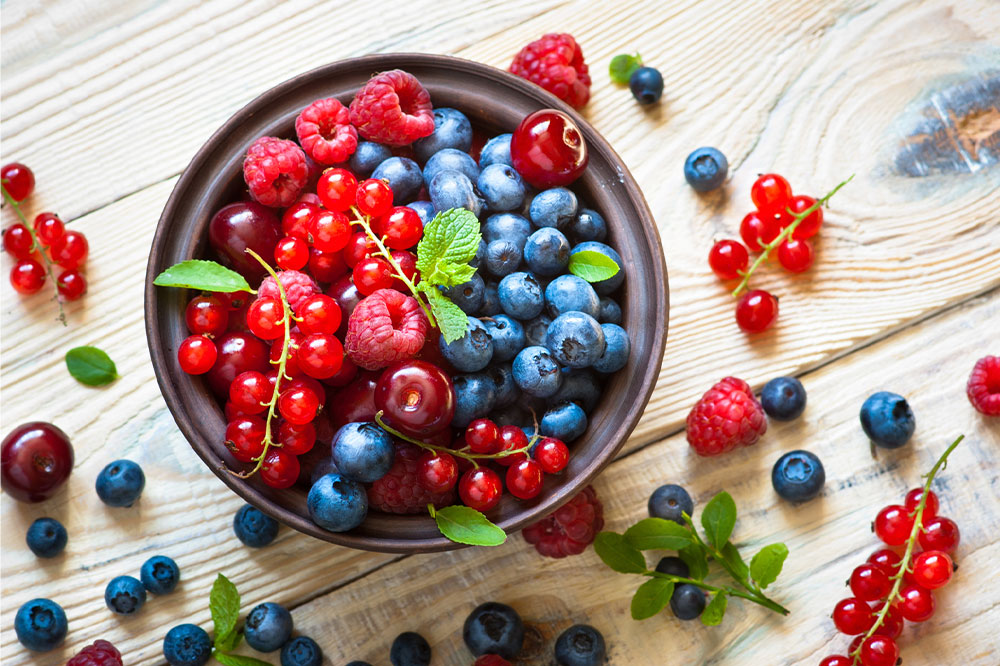16 foods that help boost the immune system

A strong immune system is important to maintain one’s health. While there is no magical cure against infections, building immunity can help prevent several illnesses, or recover faster. Adding a variety of foods rich in antioxidants, vitamins, and minerals to one’s meals can help strengthen the immune system to fight off infection-causing pathogens. Here are 16 foods that can enhance immunity and help prevent illnesses.
Red bell peppers
Red bell peppers are one of the richest sources of vitamin C. A 100-gram serving of red bell pepper contains about 127.7 mg of vitamin C, which is 159 percent of one’s recommended daily intake. They are also a rich source of beta-carotene, which is converted into vitamin A. Due to their high vitamin content, red bell peppers are excellent for boosting immunity. Moreover, vitamin C helps keep skin healthy, while vitamin A contributes to healthy skin and eyes.
Blueberries
Blueberries contain a particular flavonoid called anthocyanin. This has potent antioxidant properties, which help strengthen the immune system, especially in the respiratory tract. According to studies, those who consume a healthy dose of flavonoids regularly are less likely to develop an upper respiratory tract infection in comparison to others.
Broccoli
A popular superfood, broccoli is packed with vitamins A, C, and E, fiber, and antioxidants, which help fortify immunity. To get the maximum benefit of its nutritional content, it is advisable to gently cook broccoli (by steaming or microwaving) or consume it raw.
Spinach
Spinach is another superfood that is packed with vitamins A, C, and E, and flavonoids. These nutrients and antioxidants help strengthen the immune system. It is advisable to lightly cook spinach to release nutrients from oxalic acid and for the easier absorption of vitamin A.
Ginger
A commonly used ingredient in recipes and healing traditions across the world, ginger has several anti-inflammatory and antioxidative properties. It contains gingerol, which can help reduce inflammation and sore throat and fight nausea. It may also help decrease chronic pain and reduce cholesterol.
Garlic
Garlic is another traditionally used ingredient. It contains sulfur-rich compounds such as allicin, which can help fight infections and slow down the hardening of the arteries. It may even help lower blood pressure levels.
Yogurt
Some types of yogurt contain live, active cultures, which act as probiotics and improve gut health. They may also strengthen the immune system to fight diseases. When buying yogurt, look for variants that have been fortified with vitamin D as it helps regulate the immune system. Further, for optimal nutrition, opt for plain yogurts without any added sugars. Turn it into a healthy midday snack option by adding some fruits and/or a drizzle of honey to it.
Sunflower seeds
Sunflower seeds are packed with nutrients such as phosphorus, magnesium, selenium, and vitamins B6 and E. These nutrients help regulate and support the immune system and keep infections at bay.
Turmeric
Its anti-inflammatory properties make turmeric a great addition to food and traditional home remedies alike. It has been used in the treatment of osteoarthritis and rheumatoid arthritis. These properties can be accorded to its main active ingredient, curcumin, which acts as an immunity booster. According to research, it may also help reduce exercise-related muscle damage.
Green tea
Green and black teas are rich in flavonoids, which can help strengthen the immune system. Green tea also contains epigallocatechin gallate (EGCG), which has antioxidant and antiviral properties that help boost immunity levels.
Papaya
Papayas are a rich source of vitamin C and they also contain potassium, magnesium, and folate, which can help improve immunity. The enzyme found in papaya, called papain, also has anti-inflammatory effects.
Kiwi
Kiwis are another rich source of antioxidants and essential nutrients such as folate, potassium, and vitamins K and C, which help support the immune system and prevent infections.
Chicken and turkey
Poultry such as chicken and turkey are a rich source of vitamin B6, which can help reduce inflammation and improve immunity. Vitamin B6 also plays a crucial role in the formation of new red blood cells. For improved benefits, make stock or broth by boiling leftover chicken bones in water. The bones contain gelatin, chondroitin, and other nutrients, which can help improve gut health and bolster immunity.
Almonds
Almonds are a rich source of vitamin E and healthy fats. Vitamin E is a potent antioxidant, which can help support the immune system. A half-cup serving of almonds can give adults their daily recommended intake of vitamin E (15 mg).
Citrus fruits
Vitamin C is vital for strengthening the immune system. Research suggests that it increases the production of infection-fighting white blood cells. Citrus fruits such as grapefruits, oranges, tangerines, lemons, and limes are some of the best sources of vitamin C. Since the body does not produce or store vitamin C, it is important to watch one’s daily consumption and meet the recommended amounts (90 mg for adult men and 75 mg for adult women).
Fish
Different varieties of fish can help boost immune function and improve overall health. These include:
- Fatty fish: Fatty fish such as albacore tuna, herring, mackerel, sardines, and trout, are rich in omega-3 fatty acids, which have anti-inflammatory properties.
- Shellfish: Some types of shellfish such as oysters, crabs, lobsters, and mussels are rich sources of zinc, which supports the immune system. However, for optimal immune function, it is advisable to meet the daily recommended intake for zinc (11 grams for adult men, and 8 grams for most adult women) and avoid overconsumption.
It is important to watch one’s fish intake closely, as some fish may contain traces of mercury or other contaminants that may cause poisoning in fetuses and children. Pregnant women must consult their doctors before adding fish to their meal plans.
Apart from these foods, some other immune system-boosting foods include strawberries, elderberries, sweet potatoes, button mushrooms, acai berries, miso, pomegranates, avocados, and watermelons.


